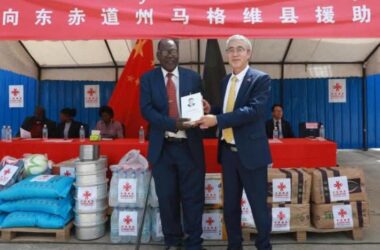By Bosco Bush
Toposa community of Eastern Equatoria State denounced Kenya’s government plans to jointly launch the construction of 11km road linking Nadapal to Nakodok.
During his official visit to Juba on November 6, Kenyan President William Ruto requested his South Sudanese counterpart, President Salva Kiir, to permit the construction of an 11 km road, aimed at enhancing trade and facilitating movement between the two nations.
In response, Paul Napwon, Chairperson of the Toposa Community, issued a statement expressing strong opposition to the project.
He raised concerns that Kenya might have intentions to annex certain areas of land, which he believes would violate legal frameworks regarding the delimitation and demarcation of the border between the two countries.
“We reject any attempt to allow the Republic of Kenya to extend the construction of the road from Nadapal to Nakodok,” he said, adding that “Kenya is claiming the 11KM Nadapal-Nakodok as part of their A1 Road Infrastructure contrary to the international boundary delimited in 1902 and 1914 Order of the Uganda Council,” read the statement.
The Toposa Community further urge the two governments of the Republic of Kenya and South Sudan to implement the Memorandum of Understanding [MOU] signed on 17th June, 2019 boundary delimitation and delimitation of the South Sudan-Kenya border.
Napwon also seek the intervention of the African Union Border Program [AUBP], TROIKA and East African Community [EAC] to prioritize and support the delimitation and demarcation of the boundaries dividing the three countries of South Sudan, Kenya and Uganda.
On November 5, Eastern Equatoria State governor, Louise Lobong urged the Ateker communities living within the tri-point to desist from border-related disputes and embrace peaceful co-existence among themselves.
This call came following a High-Level Meeting of Ateker Leaders convened in Moroto, Uganda for Border Communities Sensitization that led to the signing of a joint report resolving to foster peaceful co-existence, deepen cultural linkages and amicably address communities-based issues.
Addressing the conference on behalf of the Minister of East African Community Affairs, Lobong called upon the Tri-Point East African Communities [EAC] living along the border to focus on their livelihoods and leave the boundaries matter to their respective country’s governments.
“Communities should leave border matters to their respective governments while focusing on their livelihoods. The Ateker should allow livestock to move freely and graze without conflict,” said Lobong.
He expressed South Sudan’s “full support” to EAC, urging continued steering of such initiatives to resolve border-related disputes.




